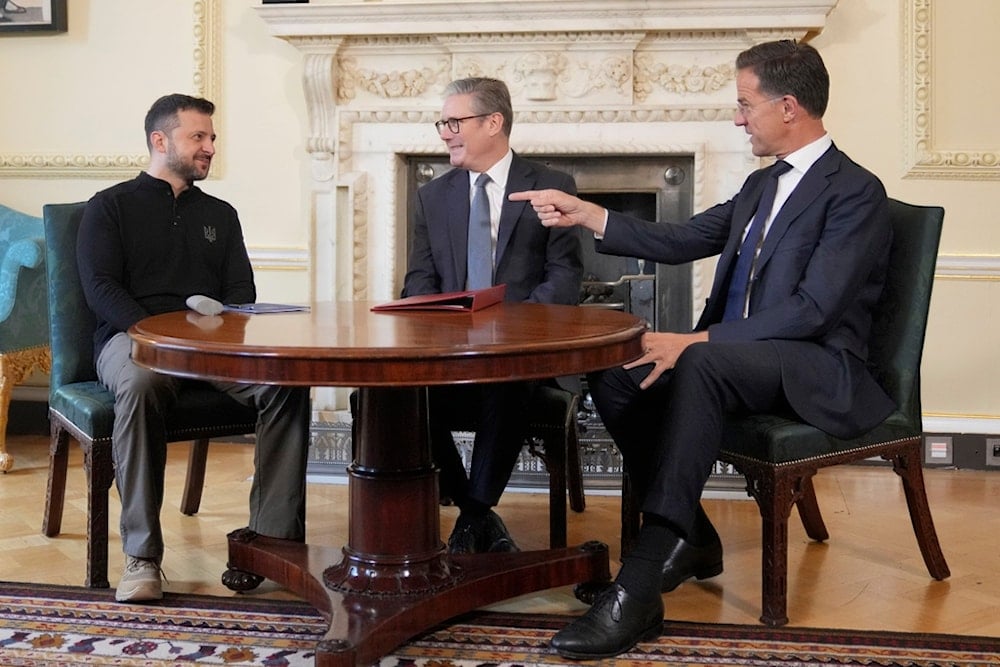Zelensky's European tour seeks support amid war, uncertain aid
Zelensky embarks on a swift European tour, meeting leaders in London, Paris, Rome, and Berlin to secure military aid and address the threat of waning US support.
-

Britain's Prime Minister Keir Starmer, center, NATO Secretary General Mark Rutte, right, and Ukrainian President Volodymyr Zelensky meet inside 10 Downing Street in London, on Thursday, Oct. 10, 2024. (AP)
Ukrainian President Volodymyr Zelensky began a rapid European tour on Thursday, meeting with UK Prime Minister Keir Starmer and NATO chief Mark Rutte to outline his strategy for defeating Russian forces.
The visit aims to secure increased military and financial support from allies during stops in London, Paris, Rome, and Berlin over 48 hours. Zelensky's push for aid comes amid concerns that US backing could wane if Donald Trump wins the upcoming presidential election. Zelensky stressed that Washington's support would be crucial given that winter is coming and Kiev's infrastructure has taken heavy hits, making the coming season more difficult and challenging than in 2023.
Zelensky, following his meeting with the UK's Stramer, announced that he had "outlined the details of our victory plan... (which) aims to create the right conditions for a just end to the war," adding, "We have agreed to work on it together with our allies."
On his part, Starmer said it was important to demonstrate London's "continued commitment" to Ukraine and that meeting with Zelensky was a chance to "go through the plan, to talk in more detail".
During his trip, Zelensky continued to press for more aid, arguing the urgency after Russian forces advanced along numerous towns and villages in eastern Ukraine.
Zelensky has also reportedly sought permission to use long-range weapons provided by allies, such as the British-supplied Storm Shadow missiles, to strike targets deep within Russia.
In his meeting with Dutch Prime Minister Mark Rutte, Zelensky raised the issue, to which Rutte noted that "legally, that is possible because legally, Ukraine is allowed to use its weapons, if they can hit targets in Russia, if these targets present a threat to Ukraine."
However, the Dutch PM stressed that decisions on providing such weapons ultimately rest with individual allies. Both Rutte and the UK cautioned against overemphasizing the role of long-range missiles in the conflict.
A spokesperson for UK Prime Minister Keir Starmer noted, “No war has ever been won by a single weapon,” suggesting that discussions should focus on a broader range of support as Ukraine faces the challenges of the upcoming winter.
It is important to note that reportedly, a meeting of Ukraine's allies in Germany, initially set for Saturday, was postponed after US President Joe Biden canceled his visit to address the threat from Hurricane Milton.
Aid uncertainty and strategic concerns
Concerns are rising over the long-term viability of Ukraine's offensive into Russia's Kursk region, especially considering the concurrent focus on the eastern front.
"If this is a short-term operation, it will strengthen us," said Bogdan, a serviceman interviewed by AFP in Druzhkivka near Kramatorsk, adding that "if it's a long-term operation and we plan to stay in Kursk, it will deplete our main resources."
Ukraine's war efforts heavily depend on substantial financial and military support from the United States. The outcome of the upcoming US presidential election in November could significantly impact this aid.
In turn, the Kiel Institute, based in Germany, warned that if Republican candidate Donald Trump wins the US election on November 5, Western military and financial aid to Ukraine could drop by half, down to around $31 billion in 2025.
"Starting next year, Ukraine could face a significant aid deficit," the institute stated.
Ukrainian defense official calls Western allies 'infantile'
Earlier this month, the Ukrainian Deputy Minister of Defense for European Integration, Aleksandr Balanutsa, has voiced frustration with Ukraine's Western backers for their reluctance to allow the use of advanced Western-supplied missiles in strikes against targets deep inside Russian territory.
Speaking at the Warsaw Security Forum, Balanutsa called out what he described as an "infantile" approach by some NATO member states, warning that unless Ukraine is fully equipped to repel Russian forces, Moscow will eventually turn its sights on NATO’s eastern flank, including the Baltic states, Poland, and Moldova.
For months, Ukrainian President Volodymyr Zelensky has sought approval to use US-made ATACMS, British Storm Shadow, and French SCALP missiles to strike within Russia's internationally recognized borders.
While London and Paris have indicated a willingness to proceed, they are waiting for Washington to give the green light.
The Biden administration remains cautious, fearing that such an escalation could widen the conflict.
Read more: US Navy was at scene of Nord Stream blasts: Danish media

 4 Min Read
4 Min Read











